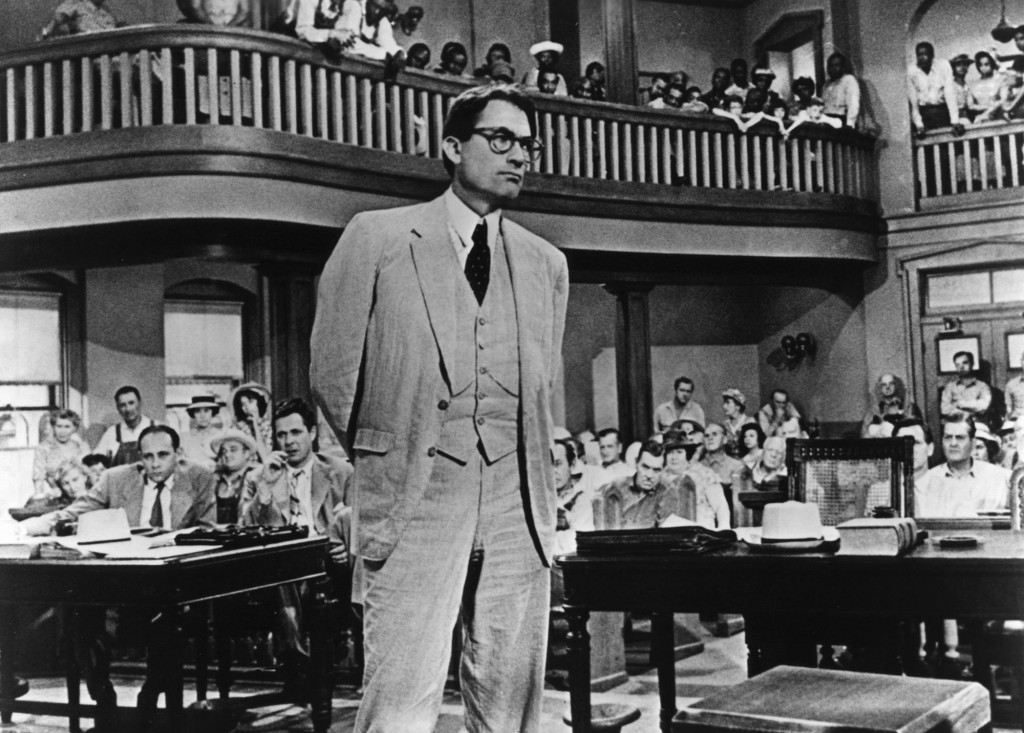Lessons on Life Still Applicable Today

To Kill a Mockingbird (1962) is one of those movies I find myself watching to the very end no matter where I pick it up. There could be only a half hour left, and I would still feel compelled to sit down and finish it. This may be the true test of a classic. The film is based on Harper Lee’s 1961 Pulitzer Prize-winning novel. The story takes place in 1932 in a small Alabaman town hit hard by the depression. Gregory Peck plays Atticus Finch—a character that every lawyer and law student is undoubtedly familiar with. Atticus is a widowed lawyer raising two very curious children. Lee’s own father was the inspiration behind Atticus Finch. While on set for filming, Lee told Gregory Peck that he even had a little pot belly just like her father. Peck jokingly replied that it was just good acting.
The story is told through the eyes of Atticus’ two children, six-year-old Scout and her older brother, Jem. The children lead a carefree life, playing around the neighborhood with their friend Dill. It was interesting to learn that Lee based the character of Dill on her friend Truman Capote. The three children are innocent and ignorant of the depths of human cruelty residing in the “tired old town.” Essentially, we witness very adult events through the children’s eyes.
The drama begins when Atticus agrees to represent Tom Robinson—a black man accused of raping Mayella Ewell, a white woman. This is a most unenviable task, even for a seasoned lawyer, in a town overwrought with bigotry. However, Atticus believes in the equality of the law, stating that “our courts are the great levelers, and in our courts, all men are created equal.”
Atticus is a warrior. He defends Tom Robinson exquisitely in spite of the town’s disapproval of him representing a “coloured man.” In court, when he asks Mr. Robinson to catch a glass with his left hand, it is revealed that his entire left arm is disabled from a previous injury. How could Mr. Robinson have caused the injuries to Mayella Ewell if they were caused by someone who is left handed? It has to be obvious to everyone that Tom Robinson is innocent, doesn’t it? The end of Atticus’ concluding statement is etched into my memory: “Now I am confident that you gentlemen will review, without passion, the evidence that you have heard, come to a decision, and restore this man to his family. In the name of God, do your duty. In the name of God, believe… Tom Robinson.” The all-white male jury, nevertheless, finds Tom Robinson guilty.
Although he technically loses, it is vitally important to understand why Atticus really wins. He has enlightened his children as to what is moral, what is right, and what is good. He demonstrates to them that real courage is standing up for what you believe in, regardless of the odds. His children can practice this throughout the rest of their lives. There is a noteworthy scene towards the end where Mr. Ewell spits in the face of Atticus as he is walking back to his car. Jem is in the car nervously watching. Atticus could easily slug Mr. Ewell. Instead, he takes out a handkerchief, wipes his face, and walks on by. If only we could all show such restraint.
The film’s most moving moment is when Atticus is leaving the courtroom after the trial has concluded. He is unaware that in the balcony above, his children and the town’s African American citizens are all standing out of respect when he passes. The Reverend tells Scout, “Stand up, your father’s passing.” It is pretty clear that Jem is at an age where he is beginning to understand the significance of the events that are unfolding around the town. His reaction to his father shooting the stray dog is one of bewilderment. It is as if he did not believe his father could do anything but read and work. On the other hand, Scout is too young to truly understand what is happening. This makes her curiosity as unadulterated as possible, and her questions all the more blunt.
A large part of the story deals with the children’s obsession with their ‘deranged’ neighbor, Boo Radley. The children tell imaginative stories as to why Boo is locked in his house. As it turns out, Boo is one of the story’s mockingbirds—an innocent person emotionally damaged by his cruel father (“Mockingbirds don’t do one thing but make music for us to enjoy…but sing their hearts out for us. That’s why it’s a sin to kill a mockingbird”). Boo saves the children from the violent attack of Mr. Ewell. When Boo is first revealed hiding behind Jem’s bedroom door, there is a long pause, possibly caused by surprise. Scout dispels all tension in an instant when she says “Hey, Boo” with a giant smile on her face.
